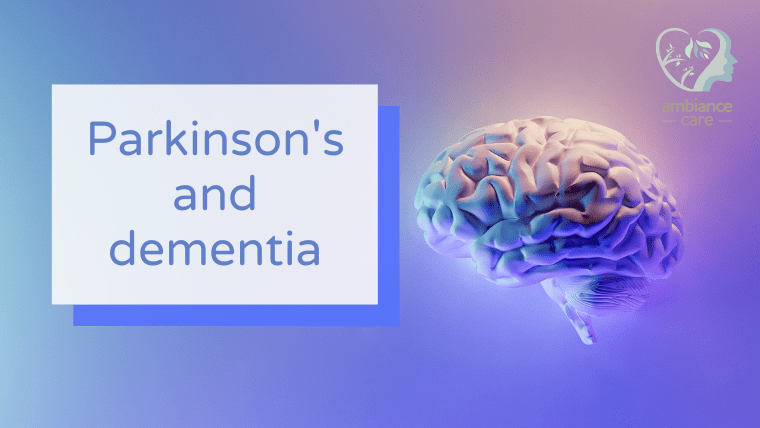Parkinson’s and dementia
Parkinson’s disease and dementia are often grouped together, but are they one and the same? Our latest blog post explores Parkinson’s and its relationship to dementia, explaining the causes, symptoms and progression of the disease, which affects around one in every 500 people in the UK.
What is Parkinson’s disease?
Parkinson’s disease is a progressive neurological condition affecting part of the brain called the substantia nigra. This region is responsible for producing dopamine, the brain’s reward chemical that also helps with regulating the body’s movement.
A person with Parkinson’s progressively loses nerve cells in this area of the brain, which reduces dopamine levels. As a result, their movement becomes slower.
About a third of people with Parkinson’s go on to develop dementia, known as Parkinson’s disease with dementia or Lewy body dementia.
What are the symptoms of Parkinson’s disease?
Parkinson’s has many symptoms but the three best-known are involuntary shaking of parts of the body, known as tremor, slow movement, and stiff muscles.
Other symptoms can include:
- Difficulty with balance
- Memory problems
- Depression and/or anxiety
- Difficulty with sleeping
- Loss of sense of smell
What causes Parkinson’s?
There’s no single specific known cause of Parkinson’s disease. Currently, it’s thought that Parkinson’s is caused by a combination of factors like age, genetics and environment.
Parkinson’s isn’t known to be hereditary in most cases but individuals who experience early-onset Parkinson’s may be more likely to have inherited it. Environmental risk factors include where somebody lives, exposure to pesticides and a previous head injury.
How does Parkinson’s cause dementia?
Parkinson’s can cause problems with memory and thinking as the brain’s chemistry and structure changes. A protein called alpha-synuclein clumps together in the brain causing something called Lewy bodies.
Lewy bodies are thought to be toxic – they may be passed between neurons, spreading the disease throughout the brain. These sticky clumps can disrupt normal functioning in the brain, leading to dementia.
When does dementia develop in Parkinson’s?
Not everybody with Parkinson’s disease will develop dementia. In fact, most people won’t – only about a third will go on to have dementia, and this is usually in the later stages of Parkinson’s disease.
Somebody with Parkinson’s disease with dementia will be diagnosed as the disease progresses, usually after the individual has experienced several years of motor symptoms. If someone experiences cognitive decline first, or if it occurs with motor symptoms and both progress closely, a diagnosis of dementia with Lewy Bodies will be made.
Around 145,000 people in the UK have Parkinson’s disease and it’s the fastest growing neurological condition in the world. Parkinson’s is more common in the over 50s but around a fifth of people are diagnosed with the disease under the age of 40.
Some studies suggest that the average time from a Parkinson’s diagnosis to the onset of dementia is about ten years. Another study has shown that three-quarters of people who have Parkinson’s for more than a decade will go on to develop dementia.
What’s the treatment for Parkinson’s?
There’s no cure for Parkinson’s disease but treatments can help relieve some symptoms and maintain an individual’s quality of life for longer.
Treatment can include medication, like dopamine agonists, as well as physiotherapy, occupational therapy and speech and language therapy.
Our team supports people living with Parkinson’s disease dementia and Lewy body dementia to continue enjoying their independence for as long as possible.
For more information following a diagnosis of Parkinson’s with dementia or Lewy body dementia, Ambiance Advice can answer all of your questions – call us today on 0161 537 0983 or email us at enquiries@ambiancecare.co.uk and we’ll get straight back to you.


